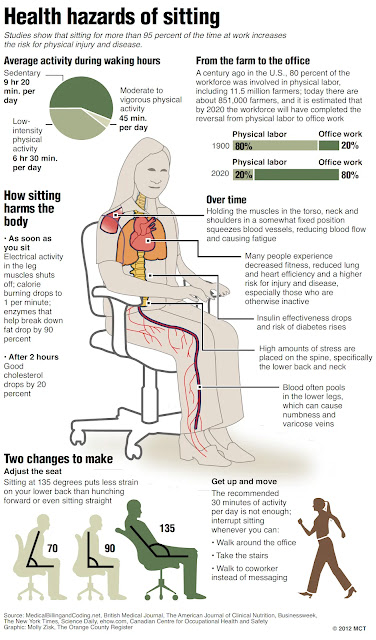The Health Risks Of Sitting For Long Hours At Work
#Heart Health&Obesity and Metabolic Disorders#
Sitting for long periods of time at work has become a common part of the modern lifestyle, especially with the rise of office-based jobs and remote working. Although sitting in itself isn’t harmful, doing so for long periods of time – often without breaks – can have significant negative consequences on both physical and mental health. Research over the past decade has identified a number of health risks associated with prolonged sitting, ranging from heart disease to musculoskeletal disorders and mental health concerns.One of the most well-documented risks of prolonged sitting is its effect on heart health. When you sit for long periods of time, blood flow slows down, especially in the lower body, which can lead to fatty acids accumulating in the blood vessels.Studies have shown that even people who get regular physical exercise may have an increased cardiovascular risk if they spend most of their day sitting. The American Heart Association has linked sedentary behavior to high blood pressure, high cholesterol levels, and a higher risk of metabolic syndrome.Sitting for hours significantly reduces the number of calories burned compared to standing or walking. This drop in energy expenditure can lead to weight gain and obesity over time. In addition, prolonged sitting has been linked to insulin resistance, which increases the risk of type 2 diabetes. When muscles are inactive for long periods of time, they lose their ability to efficiently regulate blood sugar levels, leading to increased blood sugar. Research shows that people who sit the most have a higher risk of developing metabolic syndrome, which includes conditions such as increased blood pressure, high blood sugar, excess body fat around the waist, and abnormal cholesterol levels.
#Muscle and Skeletal Problems&Mental Health Effects#
Sitting for long periods of time, especially with poor posture, can put unnecessary stress on the spine and surrounding muscles. People working in an office often experience back pain, neck strain, and shoulder discomfort due to prolonged static posture and inadequate ergonomic setup. The lower back is particularly vulnerable because sitting puts more pressure on the lumbar discs than standing or walking. Over time, this can lead to chronic pain and even degenerative disc disease. Additionally, sitting for long periods of time can lead to tight hip flexors and weak gluteal muscles, which can lead to muscle imbalances and joint problems.Beyond physical health, sitting for long periods of time can have a negative impact on mental health. A lack of physical activity reduces the production of endorphins and other mood-enhancing chemicals in the brain. In addition, sedentary behavior often goes hand in hand with social isolation, especially in remote or isolated work settings.Regular activity helps maintain better circulation and oxygen flow to the brain, increasing alertness and attention.
#Increased risk of certain cancers&Deep vein thrombosis (DVT)#
Emerging research has also found a link between sedentary behavior and an increased risk of certain types of cancer. For example, sitting for long periods of time increases the risk of colon, endometrial, and breast cancer. While the mechanisms are not fully understood, it is thought that sedentary time may affect hormone levels, inflammation, and immune system function — all of which may play a role in cancer development. In addition, sedentary behavior is often associated with other unhealthy habits, such as poor diet and smoking, which can further increase cancer risk.Sitting for long periods of time, especially without moving or changing positions, can cause poor blood circulation in the legs and increase the risk of deep vein thrombosis (DVT). Many people who sit for long periods of time sit with poor posture – hunched shoulders, a hunched neck or an unsupported back. This can lead to a variety of musculoskeletal problems, including tension headaches, carpal tunnel syndrome and repetitive stress injuries. Poor ergonomics can worsen the health effects of sitting by increasing spinal misalignment and muscle tension.
Click here more site>>>>>>>>Enjoy in gurugram
-

.jpg)


Comments
Post a Comment